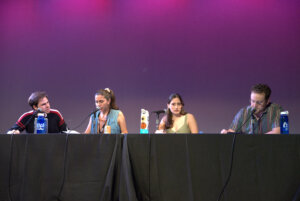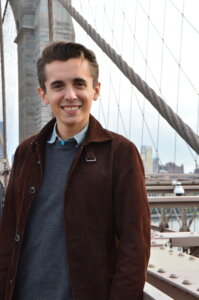Michael Fraiman (left) debuted his new audio drama “Justice: A Holocaust Zombie Story” at the Ashkenaz Festival last week. Photo by Samuel Eli Shepherd
Journalist Michael Fraiman knew writing an audio drama about zombie Holocaust victims would offend people. His email inbox had been inundated for months with messages from strangers disgusted by the very idea of associating the Shoah with a crass monster.
But the funny thing is, Fraiman told the crowd in Toronto at the Ashkenaz Festival last Saturday, no one had even listened to the podcast yet. Up until that point, there was only a trailer uploaded, which barely gave a glimpse into what the story was about.
“They saw the words ‘Holocaust zombie’ and let their emotions take over without bothering to learn the truth,” said Fraiman. “Which is exactly what happens in the script!”
Justice: A Holocaust Zombie Story released its first two episodes on Aug. 31. Produced by the podcast department at The Canadian Jewish News – which Fraiman spearheads – and in partnership with Dandelion Theatre and the Ashkenaz Festival, the seven-part miniseries uses science fiction to consider how modern society memorializes victims of the Nazi genocide.
The drama follows Kat, a university student who recently discovered she is Jewish. Eager to connect with her heritage, Kat goes on a trip to visit her uncle in Berlin. She picks up a hitchhiker with her cousins while investigating reports of a gravedigger at the nearby Sachsenhausen concentration camp.
When the hitchhiker starts moaning in a guttural Yiddish accent – and the drivers notice the number tattooed on his arm – Kat and her cousins come to understand that they did not pick up some random person off the side of the road. Rather, they are riding with a victim of the Holocaust who has risen from the dead.
On Saturday, three actors from the drama sat along a long-table and re-enacted scenes from the first few episodes in front of a live audience.
Max Ackerman filled in for the role of The Zombie, growling into the microphone. The crowd chuckled as the cousins panicked about what to do.

Earlier in the week, Ackerman, a Toronto theater director who partnered with Fraiman to bring the drama to life, told me the story was meant to be more funny than frightening.
“I would say it leans more to comedy,” said Ackerman. “It’s more thrillers than pure horror.”
At the same time, Ackerman said he hopes that the podcast inspires people to learn the real stories of Holocaust victims, even if they are drawn in by the story’s more ridiculous elements.
“Jews have always used comedy to educate,” said Ackerman, who saw nothing controversial about the series’ approach. “Jews have relied on comedy for centuries to communicate immense hardship. What are we supposed to do if not laugh at it?”
In the podcast, the cousins debate what to do with their newfound monster friend, who they affectionately name “Moishe.”
Tem, a premed student passionate about social justice, considers bringing Moishe to the German government so he can be studied and contained. Jacob, Tem’s macho, right-wing brother, argue that Moishe is being given a second chance in life and should instead be allowed to roam free.
Speaking from his home recording studio over Zoom, Fraiman explained that the show’s plot was intended to convey how people project their own contemporary interests onto the Holocaust.
“There’s a lot of talking and a lot of yelling, but there’s not a lot of listening to the zombie itself,” said Fraiman.
Fraiman said this mirrors how in contemporary North American politics, people have weaponized the Holocaust to advance specific political and social agendas, often at the expense of real life victims.
“Victims who cannot speak for themselves become a blank slate for the public,” he said. “Activists, conspiracy theorists, religious leaders —almost every character in this series is trying to manipulate the situation to their own advantage.”
Fraiman also emphasized that the story was grounded in real history and research into the Holocaust, informed by his own background as a Jewish journalist. He said he thinks of his work as a form of “subversive Holocaust education.”
“The reference specific camps, they reference specific numbers, even the hospitals referenced are real geographic places,” said Fraiman of the characters in the drama. “Aside from the zombies, all the facts are real.”

I hope you appreciated this article. Before you go, I’d like to ask you to please support the Forward’s award-winning, nonprofit journalism during this critical time.
Now more than ever, American Jews need independent news they can trust, with reporting driven by truth, not ideology. We serve you, not any ideological agenda.
At a time when other newsrooms are closing or cutting back, the Forward has removed its paywall and invested additional resources to report on the ground from Israel and around the U.S. on the impact of the war, rising antisemitism and the protests on college campuses.
Readers like you make it all possible. Support our work by becoming a Forward Member and connect with our journalism and your community.
— Rachel Fishman Feddersen, Publisher and CEO

















